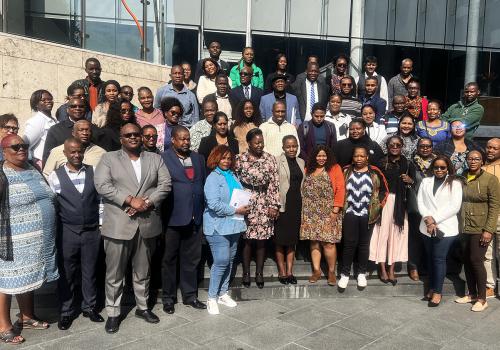The Southern African Development Community (SADC) Treaty, which outlines basic concepts such as democracy, human rights, and the rule of law, is the cornerstone of electoral democracy in the SADC Region. This was one of the key points made by the Deputy Chairperson of the SADC Electoral Advisory Council (SEAC) from the Republic of Zambia, Advocate Kasumpa Mwansa Kabalata, during a training workshop for Regional Long-Term Election Observers held in Johannesburg, South Africa from 8th – 15th May 2023.
The workshop was financed by the European Union under the 11th European Development Fund (EDF) and was facilitated by the Electoral Institute for Sustainable Democracy in Africa (EISA) and supported by the SADC Secretariat technical team. Held under the 'Support to Peace and Security in the SADC Region (SPSS) Programme, the training aims to enhance the capacity and efficiency of the Peace and Security Architecture.
All SADC Member States are required by their sovereignty law to conduct elections in order to create a conducive environment for citizens to contribute to the consolidation of democracy and preserving democratic principles.
Through the SADC Electoral Observation Mission (SEOM), SADC participates in observing elections in all of its Member States. The SEOM observes elections in accordance with the adopted practice that assists Member States in ensuring regular and credible elections, namely the three-tier electoral observation approach that includes pre–election assessments, assessments during elections, and assessments post-elections.
Advocate Kabalata emphasised the importance of ensuring that observers adhere to the code of conduct as outlined in the SADC Principles and Guidelines Governing Democratic Elections, and those applicable in the individual SADC Member States. She added that the inclusive, accurate, and impartial observation of national elections, as well as the sharing of experiences and information about democratic development among Member States, are the key enabling factors for enhancing electoral integrity.
She added that the training was designed to expose the observers to the realities on the ground where they will be deployed, and called on the observers to absorb the technical capacity to prepare them for possible deployment in support of SADC Member States conducting elections.
She urged the observers to maintain an objective mindset, undergo intensive pre-deployment training, and conduct themselves with maturity, diplomatic tact, discretion, and appreciation for the political and cultural environment of the community where the SEOM is deployed.
At least four SADC Member States are preparing for general elections in 2023, and the purpose of the workshop was to broaden the number of observers as well as capacitate them with required knowledge for observing elections. The SEOMs are anticipated to be deployed to Zimbabwe, Eswatini, the Democratic Republic of Congo and Madagascar this year.
In continuously improving SADC experience, election observers play a crucial role in enhancing electoral integrity, improving the accuracy of national elections, and promoting democratic development and principles.
The training consisted of a variety of knowledge-building and practical sessions on the use of ICT tools to access the electoral cycle which key undertakings are conducted in the pre-election, during election and post-election periods.
The SEOMs are among the pillars of the SADC agenda as they strengthen democracy by facilitating the monitoring of the implementation of regional electoral standards, identifying areas for development in Member States' electoral systems, and conducting electoral reviews and making recommendations.
Accordingly, in line with the revised SADC Principles and Guidelines Governing Democratic Elections (2021), the Secretariat coordinates technical, logistical and administrative arrangements for the deployment of the SEOMs.
The pool of observers included government officials, civil societies, experts from Electoral Management bodies (EMBs) and independent experts. This diversity of skills is intended to ensure that the SADC has a highly competent pool of electoral experts, endowed with ICT-based skills to observe, assess and report on electoral processes in Member States.

